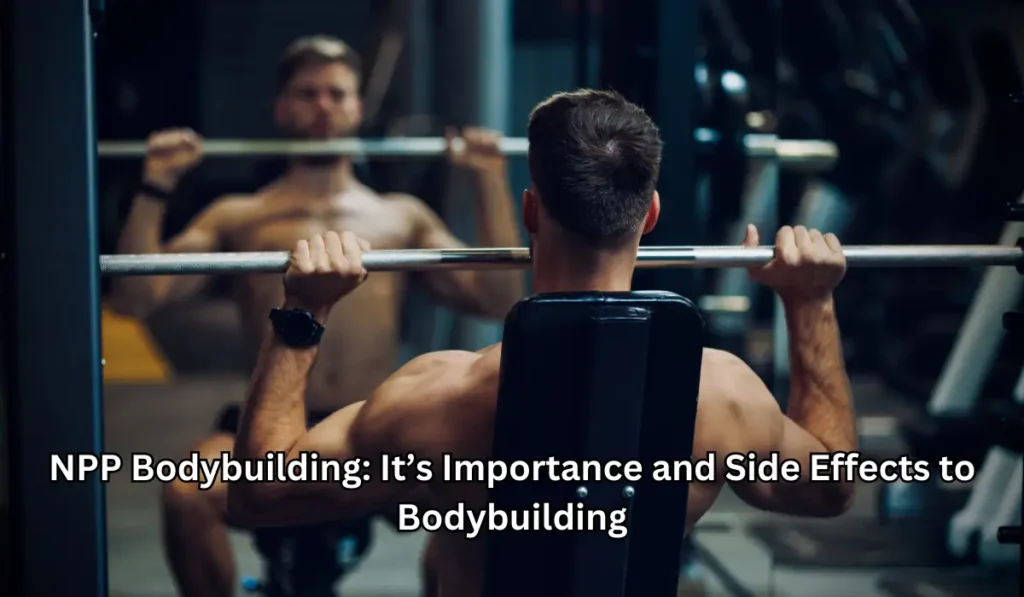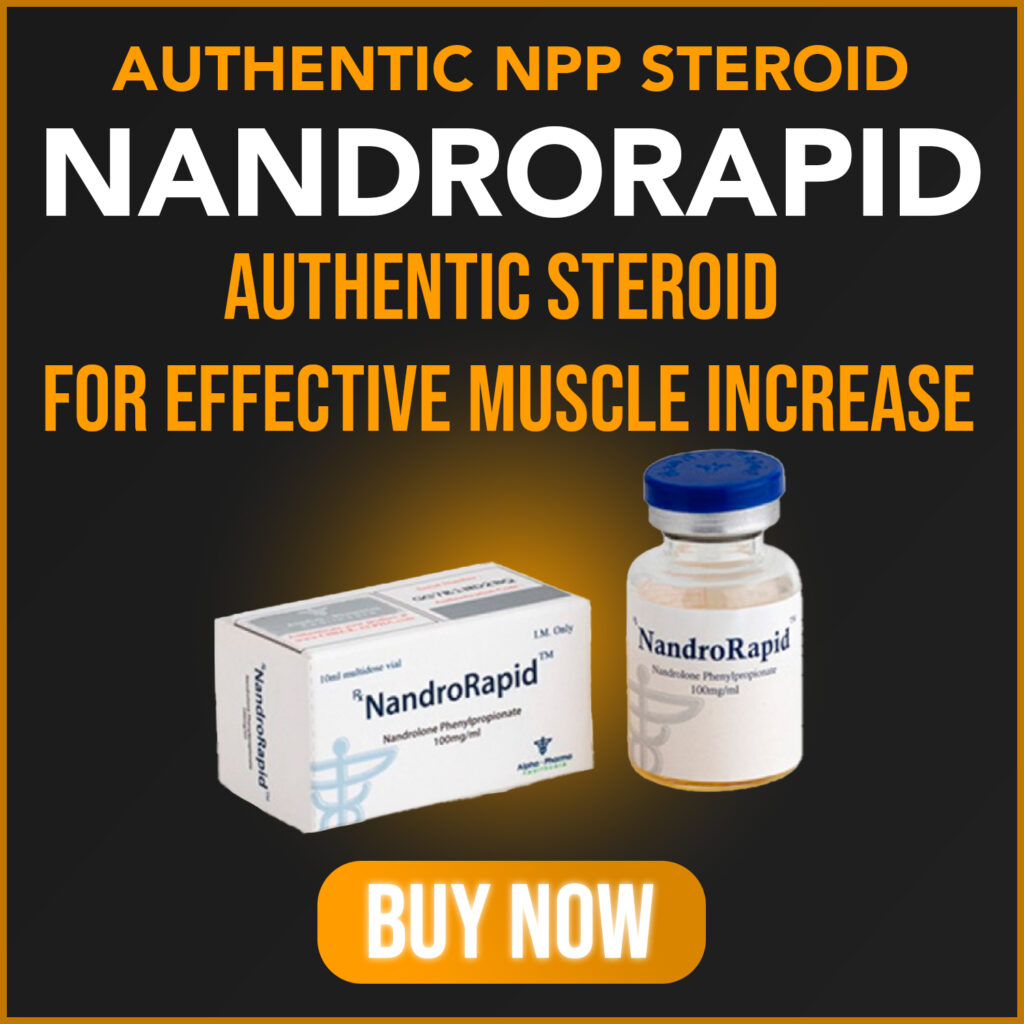
NPP Bodybuilding: It’s Importance and Side Effects to Bodybuilding
NPP has been used mainly in the treatment of advanced in women and as an therapy for the treatment of or in women. Historically, it has also had a variety of other uses. Because of its reduced androgenic effects, the drug has not generally been used in for in men and has instead been used solely for anabolic indications. However, nandrolone esters have more recently been proposed for the treatment of androgen deficiency in men due to favorable properties including their high ratio of anabolic to androgenic effects and consequent much lower risk of , , and relative to testosterone. USA Steroids Shop NPP (Nandrolone Phenylpropionate) is an anabolic androgenic steroid that is commonly used in bodybuilding and athletic circles. It belongs to the family of synthetic derivatives of testosterone and is known for its anabolic properties, which promote muscle growth and strength. NPP is often used in bulking cycles to help users gain lean muscle mass and improve their overall physique. It enhances protein synthesis in the body, which leads to increased nitrogen retention and a positive nitrogen balance. This helps the muscles to recover faster from intense workouts and promotes the development of new muscle tissue. One of the key benefits of NPP is its ability to provide joint pain relief and improve collagen synthesis. This makes it popular among bodybuilders who may experience joint discomfort due to heavy lifting and intense training.
NPP: It’s Importance to Bodybuilding
NPP is used for by , , and . Nandrolone esters have been said to be the most popular AAS used by bodybuilders and in sports.This is in part due to the high ratio of anabolic to androgenic effect of nandrolone and its weak propensity for and . NPP (Nandrolone Phenylpropionate) can have several effects on bodybuilding when used by athletes or bodybuilders. These includes the following: Increased muscle growth: NPP is known for its anabolic properties, meaning it promotes muscle growth. It enhances protein synthesis, which allows the muscles to repair and rebuild at an accelerated rate. This can lead to increased muscle size and strength gains. Improved recovery: NPP can help bodybuilders recover faster from intense workouts. It aids in the repair of damaged muscle tissue, reduces muscle soreness, and enhances overall recovery. This allows individuals to train more frequently and potentially achieve better results. Enhanced nitrogen retention: NPP increases nitrogen retention in the muscles. Nitrogen is an essential component of protein, which is crucial for muscle growth. By maintaining a positive nitrogen balance, NPP supports the body’s ability to build and preserve muscle tissue. Joint pain relief: NPP has been reported to provide relief from joint pain and improve joint health. It does this by promoting collagen synthesis and lubrication of the joints. Bodybuilders who engage in heavy lifting and intense workouts may benefit from the joint protective effects of NPP. Increased red blood cell production: NPP can stimulate the production of red blood cells in the body. This leads to improved oxygen-carrying capacity, which can enhance endurance and delay fatigue during workouts. It may also result in better muscular pumps and vascularity. It’s important to note that the effects of NPP can vary from person to person, and individual response may depend on factors such as dosage, duration of use, genetics, diet, and training regimen. The most frequent side effects of NPP include virilization (masculinization) in women, which includes signs like acne, hirsutism (increased body/facial hair growth), hoarseness of the voice, and voice deepening.[3] However, in comparison to most other AAS, NPP has a greatly reduced propensity for virilization, and such side effects are relatively uncommon at recommended dosages. Additionally, the use of NPP, like other anabolic steroids, carries potential risks and side effects, as mentioned earlier. Responsible and informed use, under the guidance of a healthcare professional, is crucial to mitigate these risks and optimize the benefits.
More Benefits of NPP to Bodybuilding
Improved strength can lead to more intense workouts, better muscle stimulation, and ultimately greater muscle growth. Reduction of body fat: npp steroid has been reported to have a slight fat-burning effect. While it is not primarily used for cutting or fat loss purposes, it can help bodybuilders maintain a leaner physique during bulking cycles. By promoting muscle growth and metabolism, NPP can contribute to an overall reduction in body fat percentage. Improved nitrogen utilization: NPP improves the body’s ability to utilize nitrogen, which is essential for protein synthesis and muscle growth. By maximizing nitrogen retention, it helps optimize the anabolic environment within the body, leading to better muscle development. Enhanced recovery from injuries: Due to its joint-protective properties and collagen synthesis stimulation, NPP can aid in the recovery from injuries commonly associated with intense training. It may help reduce pain, inflammation, and promote healing, allowing bodybuilders to get back to their training routine more quickly. It’s worth emphasizing that the use of NPP or any other performance-enhancing substances should always be approached responsibly and with proper medical supervision. Understanding the potential benefits and risks, as well as adhering to appropriate dosages, cycle lengths, and post-cycle therapy, is essential to ensure the best possible outcomes while minimizing potential adverse effects.
See info about Guide on Dianabol Price

Side Effects of NPP You Need to Know Before Using
The use of NPP (Nandrolone Phenylpropionate) in bodybuilding, like any other anabolic steroid, can be associated with several potential side effects. It’s important to be aware of these risks before considering the use of NPP or any other performance-enhancing substance. Because NPP has a low androgenic rating, a lot of people mistakenly believe that the androgenic side effects will be minimal or nonexistent. NPP is frequently cycled, though. big acne outbreaks, particularly on the back, greasy skin, and accelerated body and facial hair development. In addition, gynecomastia may result from an increase in progesterone. Men’s libidos are notoriously decreased by nandrolone. While using a 19-nor combination, many individuals experience weaker erections or an inability to climax.
The common side effects of NPP could be:
Androgenic side effects: NPP can exhibit androgenic properties, which may include acne, oily skin, increased facial and body hair growth, and the potential for male pattern baldness, especially in individuals predisposed to it. Estrogenic side effects: NPP can convert to estrogen in the body, leading to potential estrogenic side effects. These can include water retention, bloating, gynecomastia (enlargement of breast tissue in males), and an increased risk of high blood pressure. Suppression of natural testosterone production: The use of NPP can suppress the body’s natural production of testosterone. This can lead to temporary hormonal imbalances and may require post-cycle therapy (PCT) to help restore normal testosterone levels. Cardiovascular risks: NPP, like other anabolic steroids, can negatively impact cardiovascular health. It may lead to an increase in LDL cholesterol (bad cholesterol) and a decrease in HDL cholesterol (good cholesterol). This can potentially contribute to an increased risk of cardiovascular issues such as heart disease, stroke, and hypertension. Liver toxicity: Although NPP is not known for being highly hepatotoxic, prolonged and excessive use can still put strain on the liver. It is important to use NPP responsibly and avoid concurrent use with other substances that may also pose a risk to liver health. Virilization in females: Female bodybuilders using NPP may experience virilization, which refers to the development of masculine characteristics. These can include deepening of the voice, enlargement of the clitoris, disruption of the menstrual cycle, and changes in body hair growth patterns. It’s crucial to understand that the severity and occurrence of these side effects can vary from person to person, and some individuals may be more susceptible than others. It’s always recommended to consult with a healthcare professional or a knowledgeable medical provider before considering the use of NPP or any other anabolic steroid. They can provide guidance, monitor your health, and help mitigate potential risks.
Other Effects of NPP You Should Understand
In addition to the previously mentioned side effects, the use of NPP (Nandrolone Phenylpropionate) in bodybuilding can be associated with several other potential side effects.
Some additional effects to be aware of:
Testosterone suppression: NPP, like other anabolic steroids, can suppress the body’s natural production of testosterone. This can lead to symptoms such as decreased libido, erectile dysfunction, fatigue, and mood changes. Post-cycle therapy (PCT) is often recommended to help restore natural testosterone production after NPP use. Increased risk of blood clotting: Anabolic steroids, including NPP, can potentially increase the risk of blood clot formation. This risk is particularly relevant in individuals who have other predisposing factors, such as a personal or family history of clotting disorders or prolonged periods of inactivity. It’s important to stay active, maintain good hydration, and be aware of any signs of blood clot-related issues, such as swelling, pain, or redness in the legs. Negative impact on lipid profile: NPP can negatively affect cholesterol levels. It may lead to a decrease in high-density lipoprotein (HDL) cholesterol, commonly known as “good” cholesterol, and an increase in low-density lipoprotein (LDL) cholesterol, known as “bad” cholesterol. This imbalance can contribute to an increased risk of cardiovascular problems, such as atherosclerosis and heart disease. Mood alterations and aggression: Some users of NPP may experience mood swings, increased irritability, and heightened aggression. These psychological effects can be attributed to the impact of the steroid on neurotransmitter systems in the brain. It’s important to monitor and manage mood changes during NPP use. HPTA disruption: Prolonged or excessive use of NPP can disrupt the hypothalamic-pituitary-testicular axis (HPTA), which regulates hormone production in the body. This can result in prolonged suppression of natural hormone production, making it more challenging for the body to recover its normal hormonal balance after discontinuing NPP use. Virilization in females: Female bodybuilders who use NPP may experience virilization symptoms, which involve the development of masculine traits. These can include deepening of the voice, enlargement of the clitoris, facial hair growth, and changes in body shape. It’s important for female users to be cautious and vigilant about potential side effects.

Recommendations You Have to Consider Before Using NPP in Your Bodybuilding
If you are considering using NPP (Nandrolone Phenylpropionate) or any other anabolic steroid for bodybuilding purposes, it’s important to approach it with caution and prioritize your health and well-being.
These are some important pieces of advice to keep in mind:
Consult with a healthcare professional: Before starting any steroid cycle, it is crucial to consult with a knowledgeable healthcare professional who specializes in sports medicine or endocrinology. They can assess your health, discuss potential risks and benefits, and provide guidance tailored to your specific situation. Educate yourself: Take the time to thoroughly research and understand the potential effects, risks, and side effects associated with NPP use. Familiarize yourself with proper dosages, cycle lengths, and post-cycle therapy (PCT) protocols. Knowledge empowers you to make informed decisions and reduces the likelihood of encountering issues. Start with low doses: It is advisable to start with a low dose of NPP to assess your individual response and tolerance. Starting conservatively allows you to gauge how your body reacts to the substance and minimizes the risk of severe side effects. Use proper cycle support: Incorporate cycle support supplements to help mitigate potential side effects and support your body’s health during NPP use. These may include liver support supplements, cardiovascular health supplements, and estrogen blockers (if necessary). Again, consult with a healthcare professional to determine the most appropriate options for you. Monitor your health: Regularly monitor your health parameters during NPP use. This can include blood work to assess hormone levels, lipid profiles, and liver function. Regular check-ups can help identify any potential issues early on and allow for appropriate adjustments or interventions if needed. Practice responsible use: Follow recommended dosages and cycle lengths. Avoid exceeding the recommended duration or increasing dosages beyond what is advised. Prolonged or excessive use can increase the risk of side effects and make it more challenging for your body to recover its natural hormonal balance. Consider the potential legal implications: Anabolic steroid use without a valid prescription is illegal in many countries. Be aware of the legal status of NPP in your jurisdiction and understand the potential consequences of non-compliance. Focus on overall health: Remember that bodybuilding is not just about the use of anabolic steroids. Prioritize a well-rounded approach to your health, including a balanced diet, regular exercise, sufficient rest and recovery, and stress management. These factors play a crucial role in achieving your desired physique and maintaining long-term well-being. Be aware of the risks and make an informed decision: It’s important to understand that the use of NPP, like any anabolic steroid, carries potential risks and side effects. Consider whether the potential benefits outweigh the potential drawbacks for you personally. Weigh the risks and benefits carefully and make an informed decision based on your individual circumstances. Remember, the information provided here is not a substitute for professional medical advice. Always consult with a healthcare professional who can assess your specific situation and provide personalized guidance.

